Copyright ©
2026 Crimson Interactive Inc. (USA)
All contents of www.ulatus.com are protected under the International Copyright Act. All rights on
this Web Site are reserved and no part of this Site shall be reproduced, stored in a retrieval
system, or transmitted in any form or by any means - electronic, electrostatic, magnetic tape,
mechanical, printing, photocopying, recording or otherwise, including the right of translation in
any language, without the permission of Crimson Interactive Inc (USA).
Vectors
by www.freepik.com
